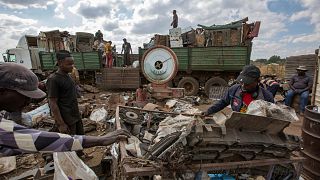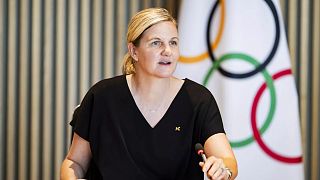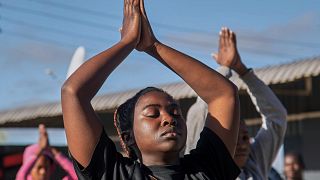Zimbabwe
Zimbabwe's opposition leader Nelson Chamisa challenged the re-election of outgoing President Emmerson Mnangagwa on Sunday officially announced the day before, and claimed victory in a flawed election whose legality has been called into question.
Mr. Mnangagwa was re-elected for a second term with 52.6% of the votes cast, against 44% for Mr. Chamisa, according to the results announced late on Saturday by the electoral commission. The opposition immediately asserted that it had not ratified these "distorted" results.
"We won this election. We are the leaders. We are even surprised that Mnangagwa was declared the winner (...) We have the real results," declared Mr. Chamisa, a 45-year-old lawyer and pastor, at a press conference in Harare on Sunday.
Zimbabweans went to the polls on Wednesday and Thursday to choose their president and members of parliament. The battle was mainly between Zanu-PF, in power since independence in 1980, and Mr. Chamisa's Citizens' Coalition for Change (CCC), the largest opposition party.
"We knew we were going to take part in an election marred by irregularities. We have an incorrect electoral roll, a flawed constituency division. The ballot was marred by anomalies. The electoral environment was biased", listed the opponent.
Emmerson Mnangagwa, who spoke earlier in the day from the presidential palace in the capital, said that the electoral process had been flawed.
Emmerson Mnangagwa, who spoke earlier in the day from the presidential palace, challenged those contesting his re-election to go to court: "Those who feel that the race was not run properly should know where to go".
- A better life -
Failures during the vote, such as the lack of ballot papers at polling stations, were particularly common in Harare, an opposition stronghold. Voting, scheduled to end on Wednesday evening, had to be extended to the following day.
International observers highlighted "serious problems" and the violation of "numerous international standards" governing democratic elections, marring the "transparency" of the ballot.
According to observers from the European Union, the Southern African Development Community (SADC) and Commonwealth countries, some voters could not be found on the lists. Others were intimidated at polling stations. Voting nevertheless took place in a "calm and peaceful" context, they stressed.
Reaffirming Zimbabwe's "independence and sovereignty", Mr. Mnangagwa warned against criticism.
"As a sovereign state, we ask our guests to respect our national institutions", he said, preferring to draw attention to the "enormous turnout in the exercise of this sacred right of voting". Nearly 69% of registered voters turned out at the polls.
In a statement, UN Secretary-General Antonio Guterres said he was "concerned by the arrests of observers and reports of voter intimidation". He called on the parties to "reject all forms of violence" and to settle disputes peacefully and "transparently" so that the outcome of the vote is "a true reflection of the will of the people".
In the streets of the capital, the day after the results were announced, some people were reading the newspapers, while others were expressing their disillusionment.
"The results are not good, there's something wrong somewhere", said Godwell Gonye, interviewed by AFP.
A little further on, another confessed he hadn't even looked closely at the results. "We accept them as they are, it's the decision of the majority and we respect it," says this man fatalistically.
However, Tinashe Gunda is adamant that "here we expect change, development and economic stability".
To win the election, the opposition was counting on this hope for a better life, in the face of rampant corruption and shortages of petrol, bread and medicines, in an economy that has been stricken for some twenty years.
But already the campaign, in this country long ruled with an iron fist by liberation hero Robert Mugabe, ousted in 2017 by a coup d'état, had been marked by unmitigated repression.
The CCC denounced the banning of dozens of rallies and arrests of opponents, in a country already plagued by a long history of elections marred by irregularities.
In 2018, Mr. Mnangagwa, Mugabe's successor, was narrowly elected (50.8%). The army fired on demonstrators two days after the poll, killing six people.
Mr Chamisa, already his presidential opponent, unsuccessfully challenged the result in court.













00:37
Zimbabwe VP Meets Vatican Envoy
Go to video
Harare City Council says bedbug infestation confined to only one locality
Go to video
Somalia launches national voter registration campaign
00:57
Gabon: Oligui Nguema clinches a landslide win
01:02
First payments made to white farmers affected by land reforms in Zimbabwe
Go to video
Zimbabwe president to suspend tariffs on imports from the United States